人教版PEP五年级英语下册第一单元知识点梳理
- 格式:doc
- 大小:15.50 KB
- 文档页数:2
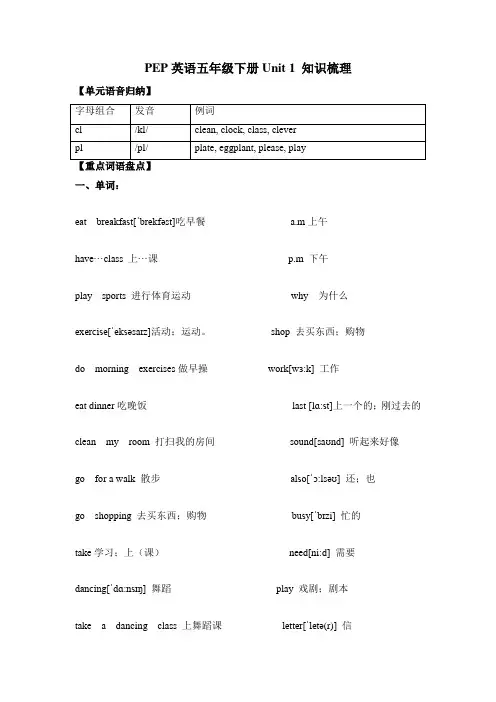
PEP英语五年级下册Unit 1 知识梳理【单元语音归纳】一、单词:eat breakfast[ˈbrekfəst]吃早餐 a.m上午have···class 上···课p.m 下午play sports 进行体育运动why 为什么exercise[ˈeksəsaɪz]活动;运动。
shop 去买东西;购物do morning exercises做早操work[wɜ:k] 工作eat dinner吃晚饭last [lɑ:st]上一个的;刚过去的clean my room 打扫我的房间sound[saʊnd] 听起来好像go for a walk 散步also[ˈɔ:lsəʊ] 还;也go shopping 去买东西;购物busy[ˈbɪzi] 忙的take学习;上(课)need[ni:d] 需要dancing[ˈdɑ:nsɪŋ] 舞蹈play 戏剧;剧本take a dancing class 上舞蹈课letter[ˈletə(r)] 信when 什么时候live[lɪv] 居住after 在(时间)后island[ˈaɪlənd] 岛start 开始always[ˈɔ:lweɪz] 总是;一直usually[ˈju:ʒuəli] 通常地cave[keɪv] 山洞Spain[speɪn] 西班牙go swimming 去游泳late[leɪt] 晚;迟win[wɪn] 获胜二、词语1. eat breakfast 吃早饭2. have…class 上……课3. play sports 进行体育活动4. exercise活动;运动5. do morning exercises 做早操6. eat dinner 吃晚饭7. clean my room 打扫我的房间8. go for a walk散步9. go shopping 去买东西;购物10. take 学习;上(课)11. dancing 跳舞;舞蹈12. take a dancing class 上舞蹈课13. go swimming去游泳【重点句型再现】1. 询问对方什么时间做某事的句型及答语—When do you finish class in the morning? 你们上午的课几点结束?—We finish class at 1 o’clock. 我们一点钟结束上午的课。

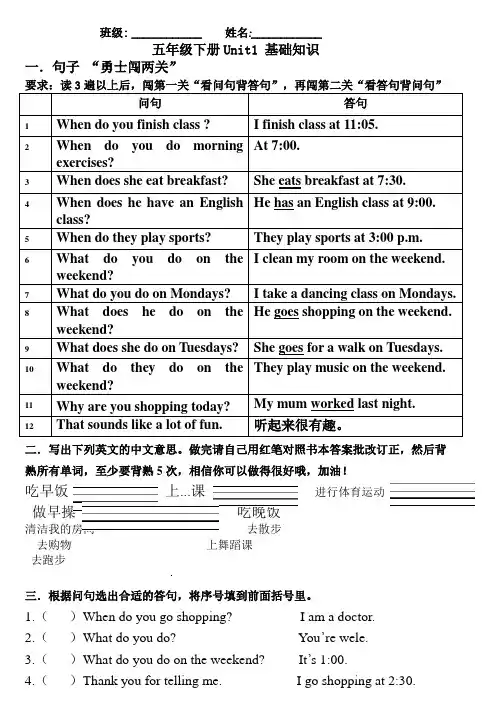
班级: ____________ 姓名:____________五年级下册Unit1 基础知识一.句子“勇士闯两关”要求:读3遍以上后,闯第一关“看问句背答句”,再闯第二关“看答句背问句”问句答句1 When do you finish class ? I finish class at 11:05.At 7:00.2 When do you do morningexercises?3 When does she eat breakfast? She eats breakfast at 7:30.He has an English class at 9:00.4 When does he have an Englishclass?5 When do they play sports? They play sports at 3:00 p.m.I clean my room on the weekend.6 What do you do on theweekend?7 What do you do on Mondays? I take a dancing class on Mondays.He goes shopping on the weekend.8 What does he do on theweekend?9 What does she do on Tuesdays? She goes for a walk on Tuesdays.They play music on the weekend.10 What do they do on theweekend?11 Why are you shopping today? My mum worked last night.12 That sounds like a lot of fun. 听起来很有趣。
二.写出下列英文的中文意思。
做完请自己用红笔对照书本答案批改订正,然后背熟所有单词,至少要背熟5次,相信你可以做得很好哦,加油!吃早饭上...课进行体育运动做早操吃晚饭清洁我的房间去散步去购物上舞蹈课去跑步三.根据问句选出合适的答句,将序号填到前面括号里。
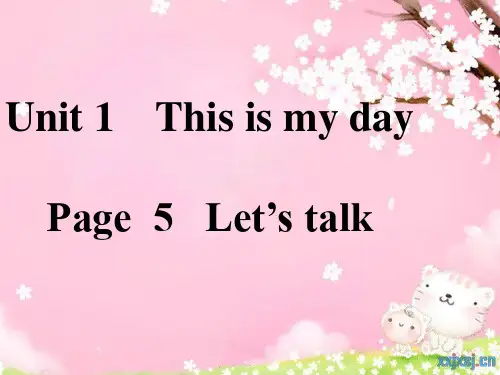
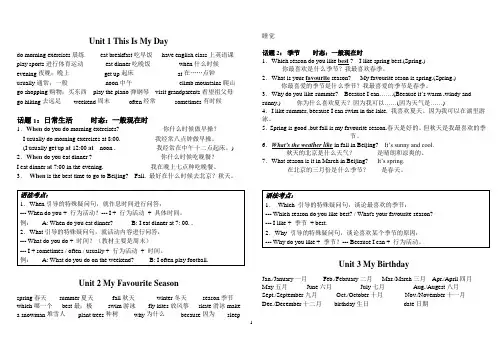
Unit 1 This Is My Daydo morning exercises晨练eat breakfast吃早饭have english class上英语课play sports进行体育运动eat dinner吃晚饭when什么时候evening夜晚;晚上get up起床at在……点钟usually通常;一般noon中午climb mountains爬山go shopping购物;买东西play the piano弹钢琴visit grandparents看望祖父母go hiking去远足weekend周末often经常sometimes有时候话题1:日常生活时态:一般现在时1.When do you do morning exercises? 你什么时候做早操?I usually do morning exercises at 8:00. 我经常八点钟做早操。
(I usually get up at 12:00 at noon . 我经常在中午十二点起床。
) 2.When do you eat dinner ? 你什么时候吃晚餐?I eat dinner at 7:00 in the evening. 我在晚上七点种吃晚餐。
3.When is the best time to go to Beijing? Fall. 最好在什么时候去北京?秋天。
Unit 2 My Favourite Seasonspring春天summer夏天fall秋天winter冬天season季节which哪一个best最;极swim游泳fly kites放风筝skate滑冰make a snowman堆雪人plant trees种树why为什么because因为sleep 睡觉话题2:季节时态:一般现在时1.Which season do you like best ? I like spring best.(Spring.)你最喜欢是什么季节?我最喜欢春季。
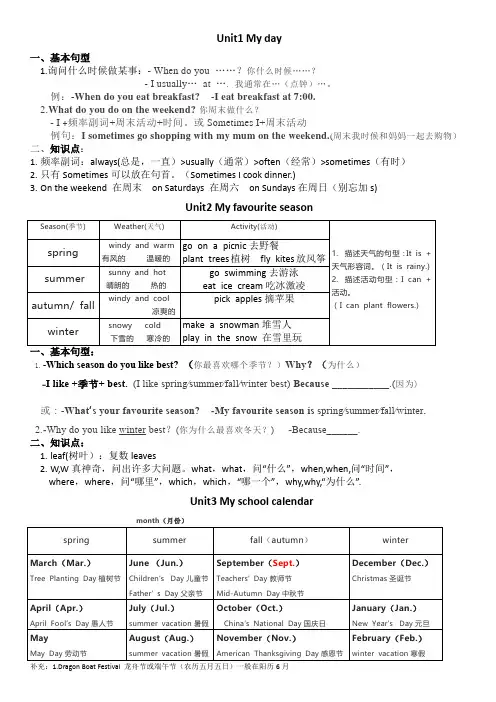
Unit1 My day一、基本句型1.询问什么时候做某事:- When do you ……?你什么时候……?- I usually…at …. 我通常在…(点钟)…。
例:-When do you eat breakfast?-I eat breakfast at 7:00.2.What do you do on the weekend?你周末做什么?- I +频率副词+周末活动+时间。
或Sometimes I+周末活动例句:I sometimes go shopping with my mum on the weekend.(周末我时候和妈妈一起去购物)二、知识点:1.频率副词:always(总是,一直)>usually(通常)>often(经常)>sometimes(有时)2.只有Sometimes可以放在句首。
(Sometimes I cook dinner.)3.On the weekend 在周末on Saturdays 在周六on Sundays在周日(别忘加s)Unit2 My favourite season1.-Which season do you like best? (你最喜欢哪个季节?)Why?(为什么)-I like +季节+ best.(I like spring∕summer∕fall∕winter best) Because ___________.(因为)或:-What‘s your favourite season? -My favourite season is spring∕summer∕fall∕winter.2.-Why do you like winter best?(你为什么最喜欢冬天?) -Because______.二、知识点:1.leaf(树叶):复数leaves2.W,W真神奇,问出许多大问题。
what,what,问“什么”,when,when,问“时间”,where,where,问“哪里”,which,which,“哪一个”,why,why,“为什么”.Unit3 My school calendar补充:1.Dragon Boat Festival 龙舟节或端午节(农历五月五日)一般在阳历6月2.月份首字母大写。

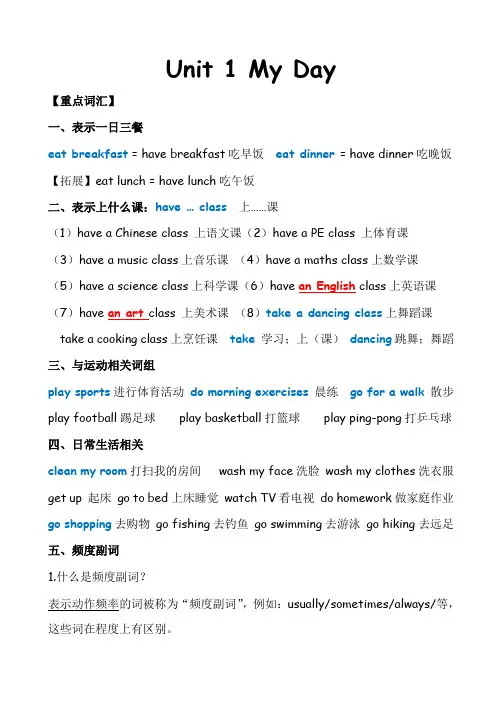
Unit 1 My Day【重点词汇】一、表示一日三餐eat breakfast = have breakfast吃早饭eat dinner= have dinner吃晚饭【拓展】eat lunch = have lunch吃午饭二、表示上什么课:have … class 上……课(1)have a Chinese class 上语文课(2)have a PE class 上体育课(3)have a music class上音乐课(4)have a maths class上数学课(5)have a science class上科学课(6)have an English class上英语课(7)have an art class 上美术课(8)take a dancing class上舞蹈课take a cooking class上烹饪课take学习;上(课)dancing跳舞;舞蹈三、与运动相关词组play sports进行体育活动do morning exercises晨练go for a walk散步play football踢足球play basketball打篮球play ping-pong打乒乓球四、日常生活相关clean my room打扫我的房间wash my face洗脸wash my clothes洗衣服get up 起床go to bed上床睡觉watch TV看电视do homework做家庭作业go shopping去购物go fishing去钓鱼go swimming去游泳go hiking去远足五、频度副词1.什么是频度副词?表示动作频率的词被称为“频度副词”,例如:usually/sometimes/always/等,这些词在程度上有区别。
2.常见频度副词按频率大小排列如下:always(100%)>usually(80%)>often(60%)>sometimes(20%~40%)> never (0%)3.注意频度副词的使用位置:①We usually go to school at seven in the morning.②What do you often do on the weekend?六、常见时间的表达方式1.at + 具体的几点钟;at noon在中午;at night在晚上2.in +月份/季节/早中晚例如:in the morning/afternoon/evening3.关于on表示时间的几种情况:①on + 星期几;②on + 几月几日;③on the weekend在周末;④on Monday morning星期一早上。
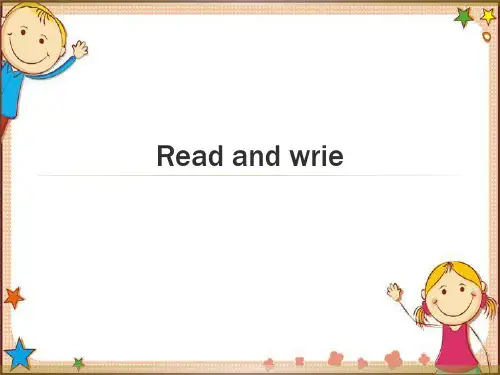
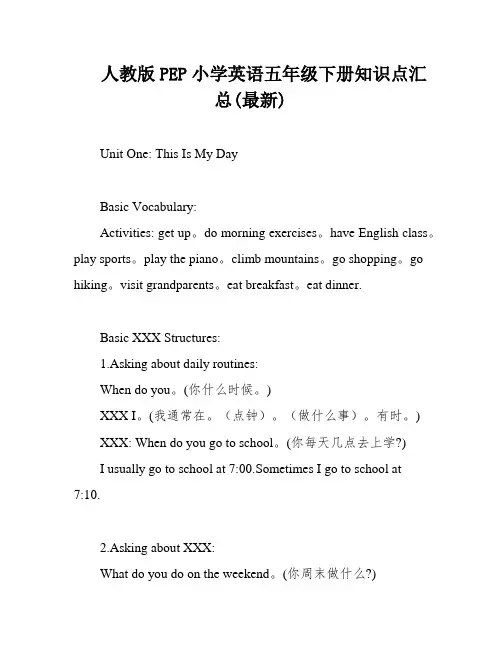
人教版PEP小学英语五年级下册知识点汇总(最新)Unit One: This Is My DayBasic Vocabulary:Activities: get up。
do morning exercises。
have English class。
play sports。
play the piano。
climb mountains。
go shopping。
go hiking。
visit grandparents。
eat breakfast。
eat dinner.Basic XXX Structures:1.Asking about daily routines:When do you。
(你什么时候。
)XXX I。
(我通常在。
(点钟)。
(做什么事)。
有时。
)XXX: When do you go to school。
(你每天几点去上学?)I usually go to school at 7:00.Sometimes I go to school at7:10.2.Asking about XXX:What do you do on the weekend。
(你周末做什么?)XXX I。
(我通常/经常。
有时。
)XXX: What do you do on the weekend?I often play XXX I go shopping with my mom.3.Introducing one's own habits:Every weekend。
I go hiking。
(我每个周末远足。
)Every day。
I do my homework at 8:00 in the evening。
(我每天晚上8点做作业。
)4.Asking XXX:What do you do。
(你是干什么的?)Time:morning。
afternoon。
evening。
noon。
at night。
6:00.on Sunday。
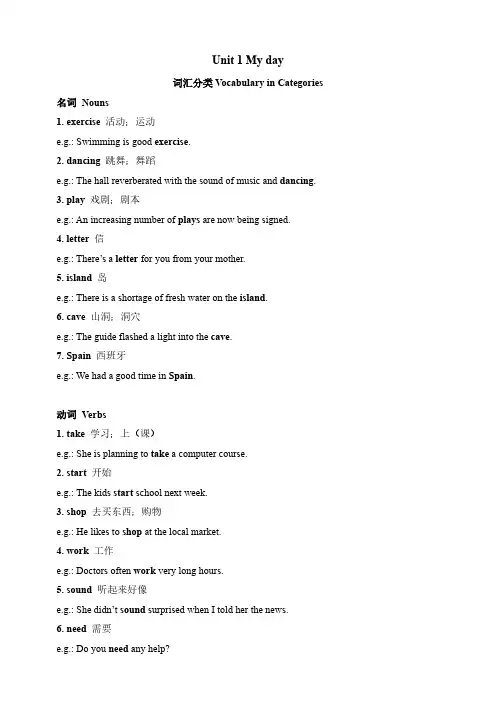
Unit 1 My day词汇分类Vocabulary in Categories 名词Nouns1. exercise活动;运动e.g.: Swimming is good exercise.2. dancing跳舞;舞蹈e.g.: The hall reverberated with the sound of music and dancing.3. play戏剧;剧本e.g.: An increasing number of plays are now being signed.4. letter信e.g.: There’s a letter for you from your mother.5. island岛e.g.: There is a shortage of fresh water on the island.6. cave山洞;洞穴e.g.: The guide flashed a light into the cave.7. Spain西班牙e.g.: We had a good time in Spain.动词Verbs1. take学习;上(课)e.g.: She is planning to take a computer course.2. start开始e.g.: The kids start school next week.3. shop去买东西;购物e.g.: He likes to shop at the local market.4. work工作e.g.: Doctors often work very long hours.5. sound听起来好像e.g.: She didn’t sound surprised when I told her the news.6. need需要e.g.: Do you need any help?7. live居住e.g.: We used to live in London.8. win获胜e.g.: She loves to win an argument.形容词Adjectives1. last上一个的;刚过去的e.g.: The last time I saw him was in May.2. busy忙的e.g.: Are you busy tonight?3. late晚;迟e.g.: Here is a late news flash.副词Adverbs1. usually通常地;惯常地e.g.: I’m usually home by 6 o’clock.2. also还;也e.g.: Prevention also plays a central role in traditional medicine.3. always总是;一直e.g.: We’re not always this busy!4. when什么时候;何时e.g.: When did you last see him?5. why为什么e.g.: Why were you late?介词Prepositions1. after在(时间)后e.g.: We’ll leave after lunch.其他Others1. a.m.午前;上午e.g.: It starts at 10 a.m.2. p.m.午后;下午e.g.: The appointment is at 3 p.m.短语Expression1. eat breakfast吃早饭e.g.: I’d rather eat breakfast and lunch at the hotel and then spend much money on a delicious supper.2. have … class上……课e.g.: I have a PE class this afternoon.3. play sports进行体育运动e.g.: Many people go dancing or play sports.4. do morning exercise做早操e.g.: Every morning several dozens of people gather in the park to do morning exercise.5. eat dinner吃晚饭e.g.: In protest, he refused to eat dinner that night.6. clean my room打扫我的房间e.g.: My father gets me to clean my room every day!7. go for a walk散步e.g.: Let’s go for a walk.8. go shopping去买东西;购物e.g.: All you ever want to do is go shopping!9. take a dancing class上舞蹈课e.g.: His daughter takes a dancing class every Saturday morning.10. go swimming去游泳e.g.: How often do you go swimming?对话Dialogues1.A: When do you get up?B: I often get up at 7 o’clock.A: When do you start class in Spain?B: Usually at 9 o’clock.A: I always start class at 8 o’clock.2.A: What do you do on the weekend?B: I often clean my room and wash my clothes. Sometimes I play ping-pong with Zhang Peng.3.A: Today is Sunday! What do you do on the weekend?B: I often go shopping with my mum.4.A: When do you finish class in the morning?B: We finish class at 1 o’clock. Then we eat lunch at home.A: Wow! When do you go back to school after lunch?B: At 2:30. Classes start at 3 o’clock.A: When do you usually eat dinner in Spain?B: Usually at 9:30 or 10 o’clock.A: Wow! That’s too late!5.A: Why are you shopping today?B: My mum worked last night. So I’m shopping today.A: Good girl! So what do you do on the weekend?B: I often watch TV and play ping-pong with my father.A: That sounds like a lot of fun.B: Yes, but I’m also hard-working. I usually wash my clothes. Sometimes I cook dinner.A: You’re so busy! You need a robot to help you!6.A: It’s Saturday now. Zoom, I’m always very busy.B: Why?A: Let me see. From Monday to Wednesday, I usually collect nuts in the afternoon. B: What else?A: On Thursday, I often dry my nuts in the sun. On Friday, I eat nuts with my friends. B: What do you usually do on the weekend?A: I often watch TV, but this weekend I have a show. I’ll play the pipa.B: When?A: Saturday, at 12 o’clock. Oh, no!核心表达Expressions1. When do you finish class in the morning?你们上午的课到几点结束?2. We finish class at 1 o’clock.我们一点钟结束上午的课。
人教版五年级下册英语第一单元知识点Unit One My day一、词汇do morning exercises做早操do homework做家庭作业watch TV看电视wash my clothes洗我的衣服have...class上......课play sports进行体育运动play sports with 和某人进行运动(拓展:play the+乐器,play+体育活动器械)eat breakfast/lunch/dinner吃早饭/吃午餐/吃晚饭clear my room打扫我的房间(拓展:clear one’s room打扫某人的房间)go for a walk=go for walks去散步go shopping去购物go swimming去游泳take a dancing class上舞蹈课always/usually/often/sometimes/never总是/通常/经常/有时/从不after在......之后get up起床go to bed去上床start class上课in+地点(在......地方)on the weekend在周末on+星期几(在星期几)in the morning在早上in the evening在傍晚at night 在晚上at home在家too late太迟/晚cook dinner做晚饭last night昨晚a lot of=lots o f大量许多be good at某人擅长做某事(Friday is good at sports.)at 7 o’clock 七点钟at 7 o’clock p.m下午七点need ......to.....需要......做某事二、语法(一)When引导的特殊疑问句,就作息时间进行问答:When do you+动词原形+其他?(在......时候做......)回答:At+时间(在几点).I+频率副词+动词原形+at+时间.(注意:频率副词的位置。
五年级下册第一单元P4重点内容一、单词1.finish完成;结束2.then然后3.after在...之后4.start开始ually通常6.Spain西班牙te晚的二、词组1.finish class结束课程2.in the morning在早上3.at home在家4.go back to school返回学校5.after lunch午饭后6.in Spain在西班牙7.too late太晚了8.at night在晚上三、句型1、When do you finish class in the morning?你们早上什么时候结束课程?We finish class at 1 o’clock.我们一点钟结束课程。
提炼:When do you+动词/动词词组+其他?I/We+动词/动词词组+at+时间.替换:When do you go back to school after lunch?I go back to school at 2:30.2、When do you usually eat dinner in Spain?你们在西班牙什么时候吃晚饭?Usually at 9:30.通常在九点半。
完整性回答:I usually eat dinner at 9:30.拓展:常见的频率副词always总是usually通常often经常sometimes有时seldom很少never从不练习:1.完成;结束__________2.然后__________3.在...之后__________4.开始__________5.通常__________6.西班牙__________7.晚的__________8.结束课程__________9.在早上__________10.在家__________11.返回学校__________12.午饭后__________13.在西班牙__________14.太晚了__________15.在晚上__________16.你们早上什么时候结束课程?__________17.我们一点钟结束课程。
人教版P E P小学英语五年级下册u n i t1至u n i t3知识点归纳-CAL-FENGHAI.-(YICAI)-Company One1五年级下册Unit 1-3重点难点、单元单词、短语和知识点知识梳理第一单元知识点一、主要单词:do morning exercises晨练,做早操 eat breakfast吃早饭 have English class上英语课 play sports进行体育活动 eat dinner吃晚饭 eat lunch吃午饭 climb mountains爬山 go shopping购物,买东西 play the piano弹钢琴 visit grandparents看望(外)祖父母 go hiking去远足二、主要句子:When do you eat dinner你什么时候吃晚饭I eat dinner at 7:00 in the evening.我晚上七点吃晚饭。
When do you get up你什么时候起床I usually get up at 12:00 at noon.我通常在中午12点起床。
What do you do on the weekend你在周末干什么Usually I watch TV and go shopping.我通常看电视和购物。
Sometimes I visit my grandparents.有时候我去看望我的外祖父母。
I often play football.我经常踢足球。
Sometimes I go hiking.有时候我去远足。
三、同义词eat breakfast—have breakfast eat lunch—have luncheat dinner—have dinner play sports—do sports usually—often复数形式:policeman—policemen policewoman—policewomen现在分词:tell—telling三单:say—says同义句:What do you do ---What are you你是干什么的四、表示频度的副词:always总是,一直 usually通常,常常 often经常 sometimes有时候五、以复数形式出现的词组:visit grandparents plant trees介词后跟表示时间的词语时,表示在某年、某月、某个季节,某个时候(在上午,在下午,在晚上)用in;表示在某一天,在星期几用on,在具体的几点几分用at.七、too 和either的用法区别:too和either都是“也”的意思,但too用于肯定句,either用于否定句。
人教版PEP五年级英语下册第一单元知识点梳理
一、重点词汇。
eat breakfast吃早餐have ... class 上……课play sports 进行体育运动exercise 活动,运动。
do morning exercises早锻炼eat dinner吃晚饭clean my room 打扫我的房间go for a walk 散步
go shopping 去购物take学习,上(课)dancing 舞蹈
take a dancing class 上舞蹈课
a.m上午p.m.下午usually 通常地
一、其他日常活动。
get up起床eat lunch吃午饭go to bed 上床睡觉wash my face洗脸wash my clothes 洗我的衣服watch TV看电视play ping-pong 打乒乓球play the pipa弹琵琶go swimming 去游泳go running去跑步
do homework 做作业do kung fu练武术play football踢足球
play basketball打篮球
二、频度副词。
always总是,一直(100%)usually通常(80%)often 经常(60%)sometimes (30%)有时
三、疑问词。
when什么时候why 为什么
四、重点句型。
1、询问别人什么时候做某事的句型及回答。
句型结构:问:When do you+动词短语原形+其他?(你/你们什么时候做某事?)
答:I/we(+频度副词)+动词短语原形+at+具体时间(我/我们通常在几点做某事。
)
例:问:When do you go to bed?(你什么时候上床睡觉?)
答:I go to bed at 9:00 p.m (我晚上9点上床睡觉。
)
注意:当主语是第三人称单数(he,she,it,单个人名或单数名词)时,助动词do要变成does,句型结构是:when
does+主语(第三人称单数)+ 动词短语原形+其他?
2、询问别人周末做什么的句型及回答。
句型结构:问:What do you do on the weekend?(你周末做什么?)答:I(+频度副词)+动词(短语)+其他。
例:问:What do you do on the weekend?(你周末做什么?)
答:I usually read books. (我通常看书。
)
注意:当主语是第三人称单数(he,she,it,单个人名或单数名词)时,助动词do要变成does,句型结构是:what
does+主语(第三人称单数)+do+on the weekend?。